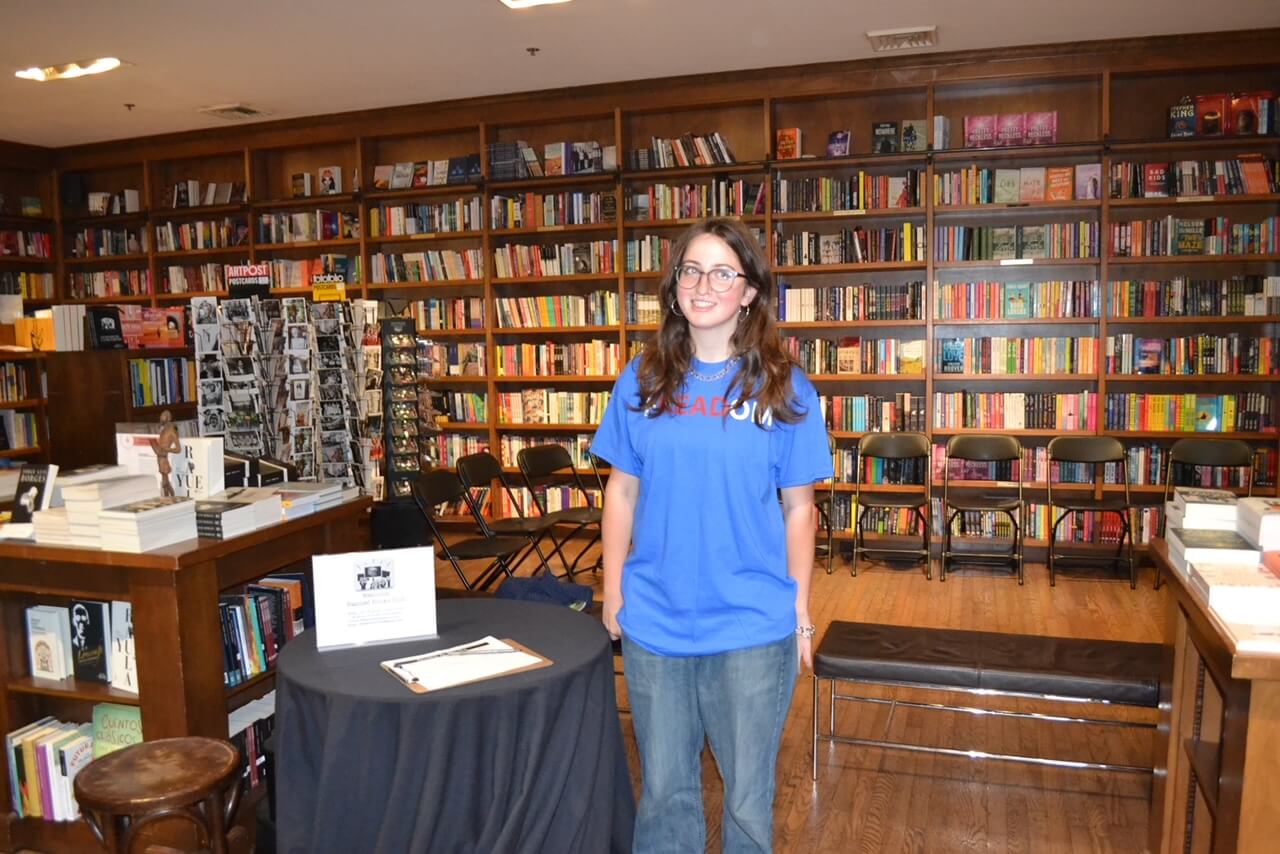How a 16-year-old Jewish high school student is fighting back against book banning in Florida
In a state than bans more books than any other, Iris Mogul is starting a conversation about George Orwell, Toni Morrison and Zora Neale Hurston

Iris Mogul poses for a photo while leading the first meeting of the Banned Books Club at Books & Books bookstore in Coral Gables, Florida. Courtesy of Iris Mogul
The group that met at a Coral Gables, Florida, bookstore on a recent Thursday evening, was, at first glance, like any other book club: some 20 people excited to chat about the writing of Zora Neale Hurston and James Baldwin. But each book they discussed had been banned by a school district in their state. And they were all gathered there by a 16-year-old Jewish high schooler named Iris Mogul.
Mogul founded the Banned Books Club this summer at Books & Books, an independent bookstore, in response to the book bans sweeping across Florida’s schools and libraries. “I wanted to start it, one, just to create a community to talk about beautiful writing,” she said. “And then, two, as an act of resistance.”
Mogul writes poems, essays, and music reviews during her spare time, and has been on a reading kick since opening High Fidelity by Nick Hornby on a bus ride to school. She is a junior at Miami’s Academy for Advanced Academics, a high school that allows students to enroll in college classes at Florida International University. Her parents raised her to challenge the status quo. Her mother directs public humanities projects focused on social justice issues, her father works at a history museum, one of her brothers is a community organizer at a climate justice nonprofit, and the other is a professional saxophone player. She remembers conversations during dinner and car rides focusing on issues like police reform, African-American history, and tenants’ rights.
She attributes much of this spirit of activism to her grandmother, Ellen G. Friedman, who survived the Holocaust and wrote a memoir titled The Seven, which recounted the experiences of her family and those of other Polish-Jewish refugees. “There was this idea passed down that we have a responsibility to help others, and share our family’s story, and hear other people’s stories,” Mogul said.
That’s part of why Mogul was so disturbed by Florida banning literature written by people from communities that have been denigrated or ignored. “The whole idea of banning books is to try and take away and erase” histories like her family’s, she said.
During the 2022-23 school year, public school districts in Florida pulled more than 1,400 books from classrooms and libraries, according to a recent report by the PEN Foundation — far more than in any other state. The report found that the vast majority of bans nationwide focus on “books on race or racism or featuring characters of color, as well as books with LBGTQ+ characters.” Among the prohibited books in Florida were the graphic memoir Gender Queer by Maia Kobabe, about the author’s journey toward identifying as nonbinary, and Beloved — Toni Morrison’s Pulitzer Prize-winning novel about an African-American woman who escapes from slavery and grapples with the trauma of her past.

This summer, Mogul called Books & Books in Coral Gables, her favorite hometown bookstore, which agreed to let her use their space to host meetings for discussing off-limits literature. At the first meeting, advertised on Instagram, Eventbrite, and the bookstore’s newsletter, around 10 people showed up. Some were teenagers, others were somewhat older; one was an English teacher and one was an audio producer. Before the meeting, Mogul was worried that they wouldn’t take her seriously because of her age, but “they were impressed,” she said. “And grateful.”
The meeting started with a discussion about why some books, such as One Flew Over the Cuckoo’s Nest and The Handmaid’s Tale, were banned around the state, then transitioned into an excited conversation about the books people were reading. “We already started to create a pretty intimate personal community,” Mogul said.
Last week, the group held its second meeting, and about twice as many people showed up to discuss Zora Neale Hurston’s Their Eyes Were Watching God, about a Black woman fighting for her freedom in early 1900s Florida. “We talked specifically about how in Florida, the attempt to ban this book in particular is erasing the horrific history” of racism in the state, Mogul said.
At one point, the conversation turned to the ways book banning had affected people’s lives. Mogul’s friends talked about how their teachers have started to avoid controversial subjects, and a woman shared how reading Beloved, which is banned in some districts in Florida, was an important experience for her daughter.
“Stopping young people from learning is doing a disservice to everyone,” Mogul said. “Because, you know, that’s the future.”
Next on the group’s reading list: James Baldwin’s Go Tell It on the Mountain.























